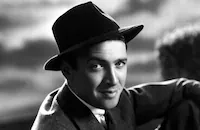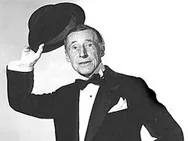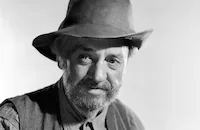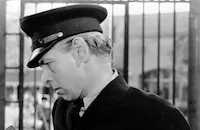You Gotta Stay Happy
Brief Synopsis
Cast & Crew
H. C. Potter
Joan Fontaine
James Stewart
Eddie Albert
Roland Young
Willard Parker
Film Details
Technical Specs

Synopsis
Moments before she is to marry stuffy Henry Benson, New York heiress Diana "Dee Dee" Dillwood complains to her uncle and guardian, Ralph Tutwiler, that she is having second thoughts. Having gone through six previous broken engagements with Dee Dee, Ralph and psychologist Dr. Blucher advise her to stop doubting herself and "plunge into it" with Henry. Dee Dee agrees, but as soon as she and Henry arrive at the Hampshire Hotel to start their honeymoon, she panics. When Dee Dee tells Henry she has made a mistake, Henry declares that he will not be humiliated and lunges for her. Wearing a dressing gown, Dee Dee runs from their room and hides in the neighboring wedding suite, which is being occupied by pilot and airline owner Marvin Payne. Dryly presuming that she is a "lost lamb," Marvin, who is staying at the hotel courtesy of night manager Dick Hebert, agrees to allow Dee Dee to spend the night in the suite. The over-excited Dee Dee, now calling herself Dottie Blucher, then asks the exhausted Marvin for a sleeping pill, and he phones Dick to have one delivered. Dick's suspicions are aroused when he sees that Marvin is sleeping on the couch and searches the suite. Dee Dee has hidden herself, however, and Dick leaves, satisfied that no "hanky-panky" is going on. Early the next morning, Marvin's business partner and co-pilot, Bullets Baker, shows up and finds Dee Dee still knocked out by the pills. Marvin explains the situation, and as they have a scheduled flight to fly, he and Bullets try frantically to wake Dee Dee, but finally are caught by Dick. While Marvin and Dick rouse and dress Dee Dee in some of Marvin's pilot clothes, Bullets stalls a young couple who are due to be married in the suite. Marvin and Bullets then sneak the half-conscious Dee Dee out of the hotel and take her to the Newark, New Jersey airport, from which their twin-engine cargo plane is to fly. There, Dee Dee begs Marvin to fly her out of town, insinuating that she is in a serious predicament. Marvin agrees to take Dee Dee as far as Chicago, then learns that the free-wheeling Bullets sold the newlyweds from the hotel, Georgia and Milton Goodrich, two "tickets" to California for $100. Just before take-off, Dee Dee confesses to Marvin that she sold a man named Mr. Caslon a ticket to California for $300. During the flight, which they share with a cigar-smoking chimpanzee named Joe, Marvin reveals to Dee Dee that he is not going to marry until he has enough money to comfortably support a family, an eventuality he calculates will not occur until 1954. When they land in Chicago, Dee Dee, who is falling for Marvin, reluctantly says goodbye to him, but he gives in and invites her to California. Soon after, a detective asks Marvin and Bullets if they are carrying a blonde who, along with her middle-aged partner, is wanted for embezzlement. Although the pilots answer no, they both conclude that the blonde is Dee Dee, especially after she returns from a shopping trip nicely dressed and bearing gifts. Once back in the air, Marvin questions Dee Dee about her situation, but she is evasive. To Bullets' annoyance, Marvin decides not to land in Kansas City, as planned, but to go on to Tulsa to avoid authorities looking for Dee Dee. Near Tulsa, however, a storm hits and Marvin makes an emergency landing in a farm field. After farmer Matt Racknell and his family invite the crew and passengers to spend the night in their home, Dee Dee and Marvin finally admit their mutual attraction and kiss. A guilt-ridden Caslon then confesses to Marvin that he is the embezzler and that his blonde secretary cajoled him into committing the crime. Now completely confused about Dee Dee, Marvin calls Dick in New York to inquire about her. The next morning, while trying to move the plane out of the muddy field, Marvin snubs Dee Dee without explanation. When Dee Dee finally realizes that he knows about her engagements and marriage, she tries to convince him that she truly loves him, but he rejects her. With the help of some Cherokee Indians, the plane is pulled to dry land and takes off for California, without Dee Dee. As soon as he lands in Burbank, Marvin learns that, because of the unexpected delays and other problems, his airline faces bankruptcy. During an impromptu stockholders meeting, however, Marvin discovers that Dee Dee has bought the company. Furious, Marvin finds Dee Dee at her aunt Martha's Bel Air home and informs her that he is not working for a woman. Dee Dee, who has just arranged for an annulment from Henry and has taken another sleeping pill, tries to argue with Marvin, but falls asleep. The next day at the airport, however, she tells Marvin that he is going to run the company while she has babies, and then presents him with his own four-engine plane.

Director

H. C. Potter
Cast

Joan Fontaine

James Stewart

Eddie Albert

Roland Young

Willard Parker

Percy Kilbride

Porter Hall

Marcy Mcguire
Arthur Walsh
William Bakewell

Paul Cavanagh

Halliwell Hobbes

Fritz Feld
Stanley Prager
Frank Jenks
Mary Forbes
Edith Evanson
Peter Roman
Houseley Stevenson
Emory Parnell

Arthur Hohl
Don Kohler
Bert Conway
Hal K. Dawson
Vera Marshe
Jimmie Dodd

Robert Rockwell
Joe, A Chimp
Bill Clauson
Eddie Ehrhart
Joe Cook Jr.
Don Garner
John Duncan
John Michaels
Hal Melone
Frank White
Beatrice Roberts
Isabel Withers
Frank Darien
Edward Gargan
Don Shelton
George Carleton
Harland Tucker
Chief Yowlachie
Charles Bruner
Al Murphy
Myron Healy
David Mcmahon
David Sharpe
William H. O'brien
Ed Randolph
Tiny Jones
Donald Dewar
Crew
Glenn Adams
Dan Alexander
Daniele Amfitheatrof
Jack Brooks
Leslie I. Carey
William Coopersmith
V. Curtis
Eddie Dodds
William Dozier
Russell A. Gausman
Alexander Golitzen
John Hambleton
Jack Hively
David S. Horsley
Lew Lacava
Walter Lantz
Joe Lapis
Ruby R. Levitt
Jean Louis
Russell Metty
Helene Parrish
Dean Paup
Kay Phillips
Milton Schwarzwald
John F. Sherwood
David Tamkin
Karl Tunberg
Karl Tunberg
Les Warner
Paul Weatherwax
Bud Westmore

Film Details
Technical Specs

Articles
Eddie Albert (1906-2005)
The son of a real estate agent, Albert was born Edward Albert Heimberger in Rock Island, Ill., on April 22, 1906. His family relocated to Minneapolis when he was still an infant. Long entralled by theatre, he studied drama at the University of Minnesota. After years of developing his acting chops in touring companies, summer stock and a stint with a Mexican circus, he signed a contract with Warner Bros. and made his film debut in Brother Rat (1938). Although hardly a stellar early film career, he made some pleasant B-pictures, playing slap happy youths in Brother Rat and a Baby (1940), and The Wagons Roll at Night (1941).
His career was interrupted for military service for World War II, and after his stint (1942-45), he came back and developed a stronger, more mature screen image: Smash-Up: The Story of a Woman (1947); Carrie (1952); his Oscar® nominated turn as the Bohemian photographer friend of Gregory Peck in Roman Holiday (1953); a charming Ali Hakim in Oklahoma (1955); and to many critics, his finest hour as an actor, when he was cast unnervingly against type as a cowardly military officer whose lack of commitment to his troops results in their deaths in Attack! (1956).
As he settled into middle-age, Albert discovered belated fame when he made the move to Hooterville. For six seasons (1965-71), television viewers loved Eddie Albert as Oliver Wendal Douglas, the bemused city slicker who, along with his charming wife Lisa (Eva Gabor), takes a chance on buying a farm in the country and dealing with all the strange characters that come along their way. Of course, I'm talking about Green Acres. If he did nothing else, Alberts proved he could be a stalwart straight man in the most inane situations, and pull it off with grace.
After the run of Green Acres, Albert found two of his best roles in the late stages of his career that once again cast him against his genial, good-natured persona: the fiercly overprotective father of Cybill Shepherd in The Heartbreak Kid (1972), for which he earned his second Oscar® nomination; and the sadistic warden in Robert Aldrich's raucous gridiron comedy The Longest Yard (1974). Soon, Albert was in demand again, and he had another hit series, playing a retired police officer who partners with a retired con artist (Robert Wagner) to form a detective agency in Switch (1975-78).
The good roles slowed down slightly by the dawn of the '80s, both film: The Concorde: Airport '79 (1979), How to Beat the High Co$t of Living (1980), Take This Job and Shove It (1981); and television: Highway to Heaven, Murder, She Wrote, Thirtysomething, offered him little in the way of expansion. Yet, Albert spent his golden years in a most admirable fashion, he became something of activist for world health and pollution issues throughout the latter stages of his life. It is widely acknowledged that International Earth Day (April 22) is honored on his birthday for his tireless work on environemental matters. Albert was married to famed hispanic actress Margo (1945-85) until her death, and is survived by his son, actor Edward Albert, a daughter, and two granddaughters.
by Michael T. Toole

Eddie Albert (1906-2005)
Quotes
Trivia
Notes
The film's opening credits are presented in animated form. Caricatures of stars Joan Fontaine and James Stewart, as rendered by Walter Lantz, are included in the sequence. Karl Tunberg's onscreen credit reads: "Produced and written for the screen by Karl Tunberg." Fontaine and Universal executive producer William Dozier were married at the time of production. Dozier and Fontaine formed Rampart Productions together, and selected You Gotta Stay Happy as a starring vehicle for Fontaine. Fontaine was pregnant during the film's production, giving birth to a baby girl a few months after principal photography was completed.
Like Stewart, who was a pilot in the Army Air Corps during World War II, director H. C. Potter was an experienced flyer. According to studio publicity material, Stewart wore his actual Air Corps flight jacket during much of the film. You Gotta Stay Happy was the first of several films in which Stewart played a pilot. Publicity material also notes that a practical C-47 ex-army plane was installed on one of the studio sound stages for use in the picture. Some scenes in the film were shot in New York and Chicago, and at the Newark, NJ airport, Slick Air Freight Terminal, according to news items and publicity. Although Hollywood Reporter announced that Frank Skinner was to score the picture, Daniele Amfitheatrof is credited onscreen with the score. Fontaine and Stewart reprised their screen roles for a January 17, 1949 Lux Radio Theatre broadcast of the story.














